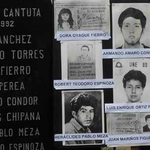Transitional Justice in Latin America: The Uneven Road from Impunity towards Accountability
This is the first book to comprehensively and systematically trace the trajectory from impunity towards accountability for past human rights violations in the Latin American region. Based on rich historical analysis, the international team of authors track, across time, the accountability achievements and challenges of nine countries: Argentina, Brazil, Chile, Colombia, El Salvador, Guatemala, Paraguay, Peru, and Uruguay. The historical analysis is supplemented with numerical scores developed specifically to capture the relative progress towards accountability on four different transitional justice dimensions (truth commissions, trials, amnesties, and reparations). While accountability levels in all countries are higher in 2014 than at the beginning of the democratic transitions in the 1980s, the movement is non-linear, with most progress occurring after 2000. Factors that help explain these trajectories include political will; civil society demands; the role of independent courts, judges, and prosecutors; and the role of the inter-American human rights system. Importantly, the mere presence or absence of amnesty laws is not found to be decisive. Innovative country trajectory graphs, cross-country graphs and ‘accountability triangles’ visually sum up the book’s findings, making complex realities easily accessible to the reader. The book will be of much interest to scholars in the fields of transitional justice and peacebuilding, as well as students generally concerned with human rights and democratisation.
Transitional Justice in Latin America: The Uneven Road from Impunity towards Accountability (Hardback) - Routledge
REVIEWS
"Finally, a book convincingly and empirically demonstrates that Latin America serves as a model on how to best deal with human rights abuses from the past. Using rich comparative narrative evidence about the transitional justice experience, the book offers an original, sophisticated and nuanced interpretation of these efforts. The authors focus on nine Latin American countries and expand the traditional analysis into the twenty first century with attention to factors influencing successes and failures while attempting to illustrate regional commonalities." - Ariel Dulitzky, University of Texas School of Law/ Member of the United Nations Working Group on Enforced or Involuntary Disappearances
"The editors take on one of the key challenges in writing about transitional justice: establishing valid systematic comparisons without losing the context and particularity of each country’s process. The writers are experts and often participants in the events they analyze, and pulling their studies together in a single volume is itself a great service to researchers and policymakers. But the editors go farther, drawing lessons from the case studies that will be applicable far beyond the Latin American context, and will add greatly to theoretical and practical discussions on the direction and future of transitional (and post-transitional) justice."- Naomi Roht-Arriaza, University of California, Hastings College of Law
"This book presents the most ambitious and systematic attempt yet to provide an in-depth comparative analysis of transitional justice processes. It combines a rigorous longitudinal analysis of case studies with a broad perspective that manages to identify and explain essential patterns and trends. The study presents an important step in shaping the development of empirical research in the transitional justice field." - Hugo van der Merwe, Centre for the Study of Violence and Reconciliation, Cape Town, South Africa
"A great contribution for our understanding of transitional justice in Latin America. It combines systematic comparative analysis with qualitative case studies and historical sequencing with synchronic assessments of policy outcomes. The challenge was great but the authors clearly succeeded!" – Catalina Smulovitz, Universidad Torcuato Di Tella
"In recent years, the transitional justice literature has been beset by a range of methodological controversies. This ambitious collection aims to achieve several things to move important debates forward. The editors usefully establish a common framework with which to more systematically analyze the rich qualitative data collected by an impressive roster of country specialists. The chapters also trace transitional justice processes over years, if not decades, which is another rarity, particularly for such a large number of cases. Some innovative data visualizations are used to illustrate outcomes in particular cases, and also to facilitate cross-national comparison across space and time. Overall, it is a welcome addition to the literature."- Eric Wiebelhaus-Brahm, University of Arkansas at Little Rock, USA

Reconceptualising Transitional Justice: The Latin American Experience
- Rights and Legal Institutions
- Argentina
- Brazil
- Chile
- Colombia
- Guatemala
- El Salvador
- Paraguay
- Peru and Uruguay
- Transitional justice
- Impunity
- Accountability
- Latin America
- Human rights
- Law
- Truth commissions
- Trials
- Reparations
- Amnesty
In this volume:
- Introduction: the accountability challenge
Skaar, Elin, Jemima García-Godos, Cath Collins - Analytical framework
Skaar, Elin, Cath Collins, Jemima García-Godos - Uruguay: halfway towards accountability
Lessa, Francescancesca Lessa - Conclusions: the uneven road towards accountability in Latin America
Skaar, Elin, Cath Collins, Jemima García-Godos






